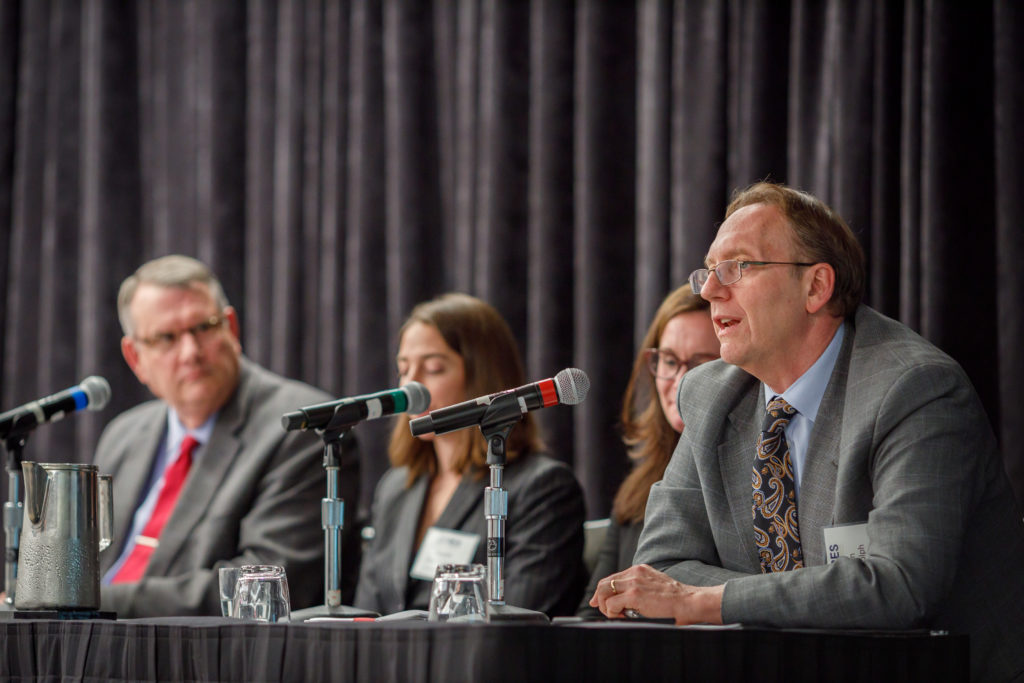
In an event held on February 25 in Washington D.C experts from industry, government and academia shared risks impacting our agricultural biosecurity. Such risks include the threat of disease outbreaks among the livestock and crops that feed billions of people and animals across the U.S. and overseas.
“Emerging, transboundary diseases pose a significant, growing threat to U.S. agriculture, the food system, and the millions of Americans that rely on it for their health and their livelihoods. U.S. farmers, ranchers, animal health companies, researchers, and government officials have improved biosecurity protocols that safeguard our crops and animals and responded efficiently to disease outbreaks when they have occurred,” said Alan Rudolph vice president for research. “Innovation and collaboration are needed to safeguard American agriculture and the U.S. food system into the future.”
The event was hosted by the Coalition for Epi Response, Engagement and Science (CERES) which works to protect and defend our agricultural industry against global health threats. CERES is a coalition of six land-grant universities including Colorado State University.
As the hosting university, CSU’s land-grant heritage was front and center throughout the day’s event, which included three panel discussions on defining the challenges in protecting agriculture and economic impacts, current policies and academic research contributions. Rudolph and Angela Bosco-Lauth, Assistant Professor in Biomedical Sciences presented on the academic research contributions and commented on the strengths of land-grant universities.
Additional speakers included Senator Pat Roberts, representatives from the American Feed Industry Association, Deputy Commander for the US Public Health Command Europe, National Pork Producers Council, George Washington University, Western Growers Association, American Farm Bureau Federation, U.S. Department of Agriculture, Association of Public and Land-Grant Universities, Kansas State University, and others who outlined roles and responsibilities of academia and government in contributing to national agriculture security.
The day was capped by comments from Neal Woollen, Senior Research Strategy Officer at the National Strategic Research Institute at the University of Nebraska who shared the complex problems that can on be solved by working across sectors and involving academia, industry and government.
About CERES
The CERES coalition was created to collaborate with land-grant universities, farmers, ranchers, animal and crop health companies, government officials and international organizations to address the most important issues facing biosecurity for American agriculture.
Other universities involved in the coalition include University of California Davis, Texas A&M, Iowa State University, University of Nebraska, University of Nebraska Medical Center, and Kansas State University.
The three goals of the CERES collation are to affect adoption of better infection control practices, rapid detection of high-consequence threats and agile vaccine stockpiling and production to thwart regional and national outbreaks of infectious diseases.
CERES Coalition coverage
- Guest Column: Wuhan Coronavirus – once again on the brink of a global health crisis, CSU researchers respond
- Agriculture Biosecurity: Q&A with Alan Rudolph and Jane Christopher-Hennings
- Guest column: Land-grant universities prepared to meet biodefense challenge
- CSU to host Bipartisan Commission on Biodefense Nov. 5
- Land-grant universities play critical roles combating existential threats to ag security
Blog written by Lauren Klamm